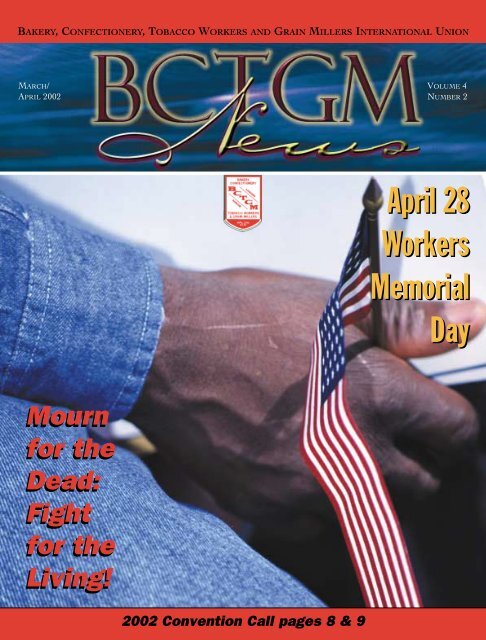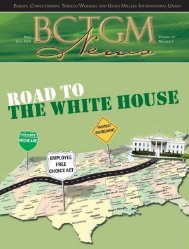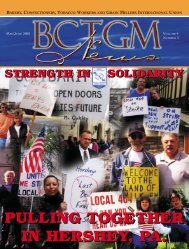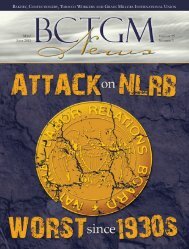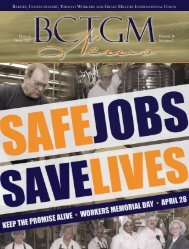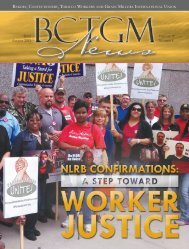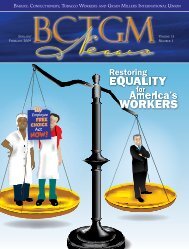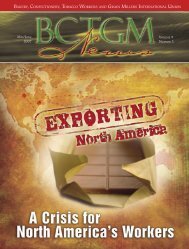to view/print. - Bakery, Confectionery, Tobacco Workers and Grain ...
to view/print. - Bakery, Confectionery, Tobacco Workers and Grain ...
to view/print. - Bakery, Confectionery, Tobacco Workers and Grain ...
- No tags were found...
Create successful ePaper yourself
Turn your PDF publications into a flip-book with our unique Google optimized e-Paper software.
BAKERY, CONFECTIONERY, TOBACCO WORKERS AND GRAIN MILLERS INTERNATIONAL UNIONMARCH/APRIL 2002VOLUME 4NUMBER 2April 28<strong>Workers</strong>MemorialDayMournfor theDead:Fightfor theLiving!2002 Convention Call pages 8 & 9
A Shining Example of BCTGM ExcellenceHillsboro, N.D.—Loyal, hardworking, dedicated <strong>and</strong> kindhearted is how his fellowBCTGM Local Local 372G membersdescribe Basil Almquest.Basil B. Almquist, 74, beganworking with American CrystalSugar in 1974 <strong>and</strong> has been abulk sugar opera<strong>to</strong>r since May1977. He has been a boardmember of Local 372G sinceits organization in 1975. In1983, he was elected financialsecretary, a position he proudlycontinues <strong>to</strong> serve.Like most BCTGM members,Basil enjoys a comfortablelife <strong>and</strong> has a loving familyhe adores.Basil <strong>and</strong> Senora,his wife of 48years, live inCummings, N.D.The Almquist’s have four children.His union membership hasplayed an important role in everyaspect of his life. His job atAmerican Crystal has helped himput four children through college,provided health care coverage infamily emergencies <strong>and</strong> enabledhim <strong>to</strong> make it through sometragic events by giving him purpose<strong>and</strong> friendship.In 1993, their daughter,Sharilyn, was in an au<strong>to</strong>mobileaccident. Her neck was brokenbetween cervical vertebrae four<strong>and</strong> five. Shari recovered but wasleft a quadriplegic. This greatlyaltered the family’s life. Together,Basil <strong>and</strong> Senora planned <strong>and</strong>made all the required housing<strong>and</strong> healthcare modifications inorder <strong>to</strong> care for Shari at home.“Shari was not going <strong>to</strong> beput in an institution,” notedLocal 372G Fin. Secy. BasilAlmquist (left) receives his 25-year pin from Pres. Terry Holm.Basil. The couple devoted eight<strong>and</strong>-a-halfyears <strong>to</strong> Shari’s care<strong>and</strong> committed their lives <strong>to</strong>making hers as comfortable <strong>and</strong>as happy as possible. Being aBCTGM member <strong>and</strong> a longtimeworker at American Crystal“I like going <strong>to</strong> work<strong>and</strong> am glad that Ican. Today’s olderAmericans are thehealthiest <strong>and</strong> mostproductive group inhis<strong>to</strong>ry.”helped Basilmeet the financialobligationsof Shari’s care. Sadly, Sharipassed away on May 13, 2001.Basil continues <strong>to</strong> work, <strong>and</strong>admits that his job <strong>and</strong> thefriendship of his BCTGM brothers<strong>and</strong> sisters has been animportant element in h<strong>and</strong>linghis grief.Noting his pride in his jobBasil says, “I like going <strong>to</strong> work<strong>and</strong> am glad that I can. Today’solder Americans are the healthiest<strong>and</strong> most productive group inhis<strong>to</strong>ry.”Basil’s job requires that hestay up-<strong>to</strong>-date with the latesttechnological advances includingcomputer operations. “There aremany new advances <strong>and</strong> techniquesin producing more <strong>and</strong>better sugar at faster <strong>and</strong> moreefficient levels,” he says.In 1999, North DakotaGovernor Shafer honoredBasil as an “outst<strong>and</strong>ing elderlyworking in North Dakota.”As the award demonstrates,Basil continues <strong>to</strong> serve as arole model for younger generations<strong>and</strong> inspires others as areflection of grace <strong>and</strong> productiveaging, demonstrating thevalue of lifelong learning <strong>and</strong>achievement while adding diversity<strong>to</strong> the workplace.In addition <strong>to</strong> his contributionsat work, Basil is a dedicatedfamily man <strong>and</strong> communitymember.And at 74, Basil insists hehas no immediate plans forretirement. Every morning Basilwalks <strong>to</strong> work, which helpsexplain his excellent health. Bywalking, Basil says, he gets <strong>to</strong>greet other BCTGM memberseither reporting for the day orgoing home after completingtheir shifts. “It is also a goodtime <strong>to</strong> think <strong>and</strong> meditate,” hesays. Basil also maintains a verylarge vegetable garden as well asseveral flower gardens in hisimmense yard.“When the time occurs,” Basil<strong>and</strong> Senora say they would like<strong>to</strong> do some traveling <strong>and</strong> visittheir family. But until then Basilcontinues his life as a proud 25-year member of the union.March/April 2002 www.bctgm.org 3
Congressional office. If youchoose not <strong>to</strong> use one of the cus<strong>to</strong>mletters found on theBCTGM’s web site or do nothave access <strong>to</strong> the internet, considerthese helpful suggestions <strong>to</strong>improve the effectiveness of theletter:State your purpose forwriting in the first paragraph ofthe letter. Only address one issuein each letter; <strong>and</strong>, if possible,keep the letter <strong>to</strong> one page. If theletter pertains <strong>to</strong> a specific pieceof legislation, identify it accordingly.Personalize your message.If you are writing on behalf ofyour local union, say so; <strong>and</strong>, ifyou are a constituent, let theMember know. If you are writingabout a legislative proposal,explain how it affects you, yourfamily, or your community.Be specific about the actionyou want the Member <strong>to</strong> take. Ifyou want information, request it.If you want the member <strong>to</strong> vote acertain way or cosponsor legislation,be specific <strong>and</strong> direct.Address your letter <strong>to</strong> yourRepresentative or Sena<strong>to</strong>r in thefollowing manner:To a Sena<strong>to</strong>r:The Honorable (insert name)United States SenateWashing<strong>to</strong>n, DC 20510To a House Member:The Honorable (insert name)U.S. House of RepresentativesWashing<strong>to</strong>n, DC 20515Call CongressYour legisla<strong>to</strong>r is there <strong>to</strong> listen<strong>to</strong> you, so you should feelfree <strong>to</strong> call. Every Representative<strong>and</strong> Sena<strong>to</strong>r maintains at leas<strong>to</strong>ne office in Washing<strong>to</strong>n, DC orin their respective state.To contact your Sena<strong>to</strong>rs orRepresentatives in Washing<strong>to</strong>n,call the Capi<strong>to</strong>l switchboard <strong>and</strong>ask for the Sena<strong>to</strong>r or Representativeby name <strong>and</strong> state. Theopera<strong>to</strong>r will connect you withhis or her office. (bctgm.org alsohas all such information.)Carefully plan your telephonecalls. Because Membersof Congress <strong>and</strong> their staffs gethundreds of calls, keep yourmessage between three <strong>and</strong> fiveminutes. You may want <strong>to</strong> writedown your points so you statethem clearly.When placing your call,identify yourself as a BCTGMmember <strong>and</strong> a constituent, callingfrom your district. Ask <strong>to</strong>speak directly <strong>to</strong> the Member ofCongress. If he or she is notavailable, ask <strong>to</strong> speak with thestaff person who is responsiblefor the issue you are callingabout.Calling district offices of aSena<strong>to</strong>r or a Representative is aseffective as calling theirWashing<strong>to</strong>n, DC offices, unlessyou must reach the memberdirectly. District staff is in constantcontact with theirWashing<strong>to</strong>n offices.Meet with your memberFace-<strong>to</strong>-face communicationis extremely effective. As legisla<strong>to</strong>rsare usually very busy, applythe letter-writing tips: keep yourvisits short, make your pointquickly <strong>and</strong> clearly, <strong>and</strong> thankthem for their time.Plan your visit carefully.Know what it is you want <strong>to</strong>achieve. Determine who shouldbe with you at the meeting <strong>and</strong>exactly what you are seeking.Make an appointment.Write or telephone the office <strong>to</strong>arrange a specific date <strong>and</strong> timefor a meeting. It will be easier forthe Member’s staff <strong>to</strong> schedule ameeting with you if they know inadvance what it is you want,whom you represent, <strong>and</strong> whowill be attending the meeting.Be prompt <strong>and</strong> patient.After arranging a meeting time,be prompt. However, because oftheir crowded schedules, theSena<strong>to</strong>r or Representative maybe late or your meeting may beinterrupted. When interruptionsoccur, be flexible <strong>and</strong> patient.Be prepared. Not only doMembers of Congress have hecticschedules; they often try <strong>to</strong>keep abreast of more issues thanit is possible for one person <strong>to</strong>know. Members are not likely <strong>to</strong>be familiar with all the details ofevery piece of legislation, <strong>and</strong>,therefore, they value direct statementsor personal examples thatdemonstrate the positive or negativeimpacts of a specific issue orpiece of legislation. You do notneed <strong>to</strong> be an expert; simplyexplain how the legislationaffects you <strong>and</strong> why you suppor<strong>to</strong>r oppose it.Be political. A definedconstituency elects Members ofCongress, <strong>and</strong> they want <strong>to</strong> beknown for representing the bestinterests of their district orstate. Wherever possible,demonstrate the connectionbetween your position <strong>and</strong> whatyou are requesting <strong>and</strong> theinterests of the Member’s constituency.Ask for a commitmen<strong>to</strong>r response.Follow up the meetingwith a letter of thanks that outlinesthe different points coveredduring the meeting, items ofagreement, next steps, additionalinformation required, <strong>and</strong> anymaterials you promised <strong>to</strong> send.March/April 2002 www.bctgm.org 5
White House Puts <strong>Workers</strong>Last in Budget PlanTThe most significant <strong>and</strong> revealingpolicy document anyPresident prepares is the federalbudget. It tells the true s<strong>to</strong>ry ofan Administration’s priorities forthe nation.The stark reality of the BushAdministration’s budget for thenext fiscal year: workers are avery low priority. In a wide rangeof programs significantly affectingworkers on the job, theBush budget calls for majorcuts in funding <strong>and</strong> staffing.Beyond these dangerousprogram cuts, theAdministration’s budget wouldsap the long-term financialstrength of Social Security <strong>and</strong>Medicare by raiding these systems<strong>to</strong> pay for huge tax breaksfor the largest multi-nationalcorporations <strong>and</strong> wealthiestAmericans over the next tenyears. Social Security <strong>and</strong>Medicare remain the corners<strong>to</strong>nesof health <strong>and</strong> economicsecurity for retired workers <strong>and</strong>their families. They should bestrengthened, not weakened.The Department of Labor faresworse than almost any otherDepartment in the Bush budget.Listed here are the most significantlyaffected worker programs.Puts <strong>Workers</strong> at RiskThe Bush budget calls formore than $9 million dollars incuts from the OccupationalSafety <strong>and</strong> Health Administration(OSHA) budget, one of thelargest cuts the agency has ever“For the BCTGM,improving workplacesafety <strong>and</strong> health willalways be a <strong>to</strong>ppriority because ourmembers work indangerous <strong>and</strong> veryphysically dem<strong>and</strong>ingindustries.”Frank Hurt,BCTGM International Presidentseen. The cuts are targeted atsafety <strong>and</strong> health st<strong>and</strong>ard development,federal enforcement <strong>and</strong>worker safety <strong>and</strong> health traininggrants. In an already understaffedagency, the budget proposal callsfor eliminating more than 80 fulltimeOSHA positions, most fromareas of enforcement <strong>and</strong> complianceassistance.The budget provides no funding<strong>to</strong> address the growing crisisof ergonomic injuries in theworkplace, which affects BCTGMmembers in all of our industries.For more than a year, the BushAdministration has been promisinga comprehensive plan <strong>to</strong>reduce these injuries. Withoutadequate funding, this is unlikely<strong>to</strong> take place.The budget also calls for alarge reduction in funding for theNational Institute forOccupational Safety<strong>and</strong> Health (NIOSH),the only federal healthresearch agency thatfocuses on workerhealth <strong>and</strong> safety.In discussing theproposed OSHA cuts,BCTGM InternationalPresident Hurt explains,“For the BCTGM,improving workplacesafety <strong>and</strong> health willalways be a <strong>to</strong>p prioritybecause our memberswork in dangerous<strong>and</strong> veryphysicallydem<strong>and</strong>ingindustries. Incontract negotiationswith ouremployers, theInternational <strong>and</strong>our local unionsare constantly seekingways <strong>to</strong> createsafer, healthier workplacesfor our members.“But we know that achievingthis goal requires an effectivefederal program. The Bush budgetwould result in a weakerOSHA that is far less effective inprotecting the health <strong>and</strong> safetyof workers. The proposal is aprescription for more workplaceinjuries, illness <strong>and</strong> deaths. TheBCTGM will vigorously opposethese cuts,” Hurt concludes.Worker Training UnderminedOne of the hardest hit areasin the Bush budget is workertraining. The Administration proposescutting funding <strong>and</strong>staffing in virtually every federal6BCTGM News
“The BCTGM willbe working with theAFL-CIO, otherlabor organizations<strong>and</strong> our allies inCongress for a federalbudget that protects<strong>and</strong> invests inworkers <strong>and</strong> makesworking families ournation’s <strong>to</strong>p priority.”Frank Hurt,BCTGM International Presidentjob-training program, includingthose designed <strong>to</strong> help laid-off<strong>and</strong> younger workers.The budget proposal wouldundermine the longst<strong>and</strong>ing federalcommitment <strong>to</strong> improving<strong>and</strong> exp<strong>and</strong>ing the skills ofAmerican workers. For manyworkers who have lost their jobsor want a better job, these programsoffer them <strong>and</strong> their familieshope <strong>and</strong> opportunity for abetter st<strong>and</strong>ard of living.More Employer AbuseThe Bush budget calls for areduction in funding <strong>and</strong> staffinglevels for the Department ofLabor’s Wage <strong>and</strong> HourAdministration, the divisionresponsible for enforcingnumerous federal laws guaranteeingbasic workplacest<strong>and</strong>ards such as minimumwage, overtime, child labor<strong>and</strong> the Family <strong>and</strong> MedicalLeave Act.With less enforcement staff,employers will likely exp<strong>and</strong>their efforts <strong>to</strong> get around theseimportant laws, which are theresult of decades of struggle byorganized labor. This abusethreatens employment st<strong>and</strong>ardsin every workplace.Congressional Action?As the expression goes, “ThePresident proposes <strong>and</strong> theCongress disposes.” The battleover national priorities is nowbeing fought in Congress. Overthe next six months, Congresswill use the appropriationsprocess <strong>to</strong> set funding levels forall federal programs for the nextfiscal year, which begins Oc<strong>to</strong>ber1, 2002.“The BCTGM will be workingwith the AFL-CIO, other labororganizations <strong>and</strong> our allies inCongress for a federal budgetthat protects <strong>and</strong> invests inworkers <strong>and</strong> makes working familiesour nation’s <strong>to</strong>p priority.“I urge our members <strong>to</strong> getThe BCTGM website is an excellent<strong>to</strong>ol <strong>to</strong> enable yourvoice <strong>to</strong> be heard . . .It’s time <strong>to</strong>st<strong>and</strong> up <strong>and</strong>be counted bycontacting yourRepresentativein Congress.involved by contacting their U.S.Representatives <strong>and</strong> Sena<strong>to</strong>rs.The BCTGM web site is an excellent<strong>to</strong>ol <strong>to</strong> enable your voice <strong>to</strong>be heard by those who have theultimate say over whether yourtax dollars are spent <strong>to</strong> improvethe lives of working families orpromote corporate interests.“Every BCTGM member has astake in the outcome of thisdebate,” concludes Hurt.March/April 2002 www.bctgm.org 7
BAKERY, CONFECTIONERY, TOBACCO WORKERS ANDGRAIN MILLERS INTERNATIONAL UNION10401 Connecticut Avenue • Kensing<strong>to</strong>n, Maryl<strong>and</strong> 20895-3961CONVENTION CALLApril 1, 2002TO ALL AFFILIATED LOCAL UNIONS:GREETINGS:The International Constitution provides, in Article III, Section 2: “The regular Convention shall be held every four years. It shallconvene on such date <strong>and</strong> in such place as the International President, with the approval of the General Executive Board, shall designate.“The International Secretary-Treasurer shall issue a Convention Call <strong>to</strong> all local unions in the third month immediately precedingthe convening of the regular Convention.“The Convention shall not extend beyond ten days of sessions, except by two-thirds vote of the duly accredited delegates.”In accordance with the above, you are hereby notified that the Thirty-Sixth Constitutional Convention of the <strong>Bakery</strong>,<strong>Confectionery</strong>, <strong>Tobacco</strong> <strong>Workers</strong> <strong>and</strong> <strong>Grain</strong> Millers International Union will convene in the city of Las Vegas, Nevada beginning at10:00 a.m., on Wednesday, July 17, 2002.QUALIFICATIONS OF DELEGATESArticle III, Section 5 of the International Constitution states that: “Every delegate <strong>to</strong> the Convention must (1) have been a continuouslygood-st<strong>and</strong>ing, dues-paying member of the International Union <strong>and</strong> local union the delegate represents for at least two continuousyears next prior <strong>to</strong> nomination; (2) be provided with properly attested credentials from the local union the delegate represents; (3)have worked at least two years immediately preceding the Convention as a wage earner in any branch of the trades, except for periodsof layoff (including layoffs arising from plant shutdowns) <strong>and</strong> terminations being grieved, not <strong>to</strong> exceed twelve (12) continuous months,under the jurisdiction of the International Union or as an officer or employee of the International Union or a local union; (4) be able <strong>to</strong>show such number of Union labels as the General Executive Board may require.(The General Executive Board has established the requirement of showing three (3) union labels.)Exempted from the requirements of (1) <strong>and</strong> (3) above shall be delegates whose local unions have not been in existence for twoyears, provided that the continuously good-st<strong>and</strong>ing, dues-paying <strong>and</strong> wage-earning period of such delegates are not less than six months.Article III, Section 4 provides:“Each local union may elect an alternate delegate at the same time the regular delegates are elected. Alternates must have thesame qualifications as delegates. In the event of the inability of any delegate <strong>to</strong> attend the Convention because of an emergency, thealternate may replace the delegate, provided that the local union notifies the International Secretary-Treasurer of the change.”ELECTION OF DELEGATESThe election of delegates is subject <strong>to</strong> provisions of the International Constitution <strong>and</strong> the Labor-Management Reporting <strong>and</strong>Disclosure Act of 1959 (L<strong>and</strong>rum-Griffin Law).REPRESENTATION OF DELEGATESThe International Constitution in Article III, Section 4, provides: “Local unions in good-st<strong>and</strong>ing including those which have beenorganized under the jurisdiction of the International Union six (6) months previous <strong>to</strong> the Convention shall be entitled <strong>to</strong> representation.Local unions with a monthly average International per capita tax on its dues-paying membership ofless than 251 shall be entitled <strong>to</strong> one (1) delegatefrom 251 <strong>to</strong> 500 <strong>to</strong> two (2) delegates;from 501 <strong>to</strong> 750 <strong>to</strong> three (3) delegates;from 751 <strong>to</strong> 1,000 <strong>to</strong> four (4) delegates;from 1,001 <strong>to</strong> 1,400 <strong>to</strong> five (5) delegates;from 1,401 <strong>to</strong> 1,800 <strong>to</strong> six (6) delegates;from 1,801 <strong>to</strong> 2,200 <strong>to</strong> seven (7) delegates;from 2,201 <strong>to</strong> 2,600 <strong>to</strong> eight (8) delegates;from 2,601 <strong>to</strong> 3,000 <strong>to</strong> nine (9) delegates;over 3,001 <strong>to</strong> ten (10) delegates;but in no case shall a local union be entitled <strong>to</strong> more than ten (10) delegates. Any two or three locals having less than one hundredmembers each located within an area of 250 miles may combine in the selection of a delegate. No other local unions may combinein the selection of a delegate <strong>and</strong> no delegate shall represent more than three such local unions.8BCTGM News
“The number of members of a union shall be the average monthly per capita tax that it has paid <strong>to</strong> the International Union on itsdues-paying membership for twelve (12) months inclusive of the fourth month (March) previous <strong>to</strong> the Convention, as certified by theInternational Secretary-Treasurer <strong>to</strong> the Credentials Committee.“Delegates representing up <strong>to</strong> twenty-five (25) members shall be entitled <strong>to</strong> one vote, <strong>and</strong> <strong>to</strong> one additional vote for each additionaltwenty-five members or major fraction thereof they represent. The number of votes of local unions which are represented bymore than one delegate shall be equally divided <strong>to</strong> the nearest whole number among all their delegates.”CREDENTIALS OF DELEGATESArticle III, Section 6 provides: “At least forty (40) days prior <strong>to</strong> the opening of the Convention, duplicates of credentials on blanksfurnished by the International Secretary-Treasurer from the authorized local union officer shall be received by the InternationalSecretary-Treasurer, or shall be postmarked not later than forty-five (45) days prior <strong>to</strong> the opening of the Convention, in an envelopeproperly addressed <strong>to</strong> the International Secretary-Treasurer.“The International Secretary-Treasurer shall cause <strong>to</strong> be published in the official journal of the International Union, in the lastissue before the Convention, but not less than fifteen (15) days prior <strong>to</strong> the convening of the Convention, a list of all the delegates-elect<strong>and</strong> the local union each delegate represents.“Delegates <strong>to</strong> the Convention shall present the original credentials bearing the seal of the local union <strong>and</strong> signatures of theauthorized officers of their respective locals <strong>to</strong> the Committee on Credentials. Protests against the delegates must be in written affidavitform, stating the specific grounds for protest <strong>and</strong> signed <strong>and</strong> sworn <strong>to</strong> by the party objecting <strong>to</strong> the seating of the delegate. These affidavitsmust be transmitted by registered or certified mail <strong>to</strong> the International Secretary-Treasurer (with a copy <strong>to</strong> the local union) <strong>and</strong>the envelope, properly addressed <strong>to</strong> the International Secretary-Treasurer, must be postmarked at least ten (10) days prior <strong>to</strong> the conveningof the Convention.”COMPENSATION OF DELEGATESArticle III, Section 7. “The International Union shall pay each delegate in attendance at the regular Convention as compensation$595 <strong>and</strong> an amount equal <strong>to</strong> the cost of regular coach transportation by air from the delegate’s home city <strong>to</strong> the Convention city <strong>and</strong>return by direct route, except as negotiated in the BC&T/AFGM merger agreement; provided, however, that such delegates remain inattendance upon the Convention commencing with its first day’s session until its adjournment. Compensation <strong>and</strong> transportation for specialconvention shall be set by the General Executive Board.“Transportation <strong>and</strong> compensation of protested delegates shall not be furnished unless <strong>and</strong> until such delegates have been seatedas accredited.”CONVENTION RESOLUTIONSArticle III, Section 10. “All resolutions by local unions <strong>to</strong> be submitted <strong>to</strong> the Convention either must be received at InternationalHeadquarters at least forty (40) days prior <strong>to</strong> the opening of the Convention, or must be postmarked in a properly addressed envelopeat least forty-five (45) days prior <strong>to</strong> the opening of the Convention. Each resolution must deal with but one subject matter, be submittedin triplicate <strong>and</strong> each copy signed only by all delegates-elect, or a majority of the Executive Board.“Resolutions by the General Executive Board may be introduced at the Convention, provided such resolutions have the approvalof a majority of the General Executive Board. All other resolutions may only be introduced with the approval of a two-thirds vote of theConvention.”Local unions are urged <strong>to</strong> forward all resolutions as soon as they are formulated in order that they may be <strong>print</strong>ed for distribution<strong>to</strong> the delegates.In order <strong>to</strong> facilitate the <strong>print</strong>ing of resolutions, each resolution must deal with only one subject, be typewritten, <strong>and</strong> only oneside of each page should be used.HOTEL ACCOMMODATIONSInformation with reference <strong>to</strong> hotel accommodations, etc., will be forwarded upon receipt of the delegate’s certified credential.GENERALWe hope that your local union will have full representation at the Thirty-Sixth Constitutional Convention of the <strong>Bakery</strong>, <strong>Confectionery</strong>,<strong>Tobacco</strong> <strong>Workers</strong> <strong>and</strong> <strong>Grain</strong> Millers International Union, AFL-CIO, CLC, in Las Vegas, Nevada. Your participation is essential inassisting us in setting priorities during the ensuing four years in important activities relative <strong>to</strong> economic advancement of our membership,political action activities, <strong>and</strong> the organizing of the unorganized workers in our jurisdiction.Fraternally yours,Fraternally yours,Frank HurtInternational PresidentDavid B. DurkeeInternational Secretary-TreasurerGENERAL EXECUTIVE BOARDJoseph Thibodeau • Larry D. Barber • Jeanne Graham • Shawn J. Grimm • Harry Guildner • Anthony Johnson • Richard Johnson• Sean Kelly • Micheal T. Konesko • Bobby Ray Mercer • Art Montminy • Robert Oakley • Ronald D. Schreiber • R<strong>and</strong>y Roark• T. J. Warren, Sr. • Joyce Als<strong>to</strong>n • George Bol<strong>to</strong>n • Edward Burpo • R<strong>and</strong>y Fulk • Lillian Gainer • Oscar Giles, Jr. • Paul LaBuda• Micheline Labrecque • Richard Lewis • Narciso Martas • Herbert W. Marx • Danny Murphy • Bradford Schmidt• William Spr<strong>and</strong>el • Charles Taylor • Doyle TownsonMarch/April 2002 www.bctgm.org 9
Supreme Court WhittlesAway at Worker RightsOOne of the defining features ofAmerican democracy is the institutionsthat are in place <strong>to</strong> protectits citizens from harm <strong>and</strong>abuse. Unfortunately, within athree-month period, the U.S.Supreme Court has significantlyh<strong>and</strong>icapped three such institutionsthat were designed <strong>to</strong> protectcitizens in the workplace:the Americans With DisabilitiesAct (ADA), the Family Medical<strong>and</strong> Leave Act (FMLA), <strong>and</strong> theNational Labor Relations Act(NLRA). The nations highestcourt ruled against workersincluding undocumented workersemployment rights, the right ofemployees <strong>to</strong> be informed oftheir right <strong>to</strong> unpaid leave, <strong>and</strong>the right <strong>to</strong> classify ergonomicinjuries (carpal tunnel syndrome,for example) as a disease.Here is a brief summary ofthose cases <strong>and</strong> their significance:Hoffman PlasticsCompound vs. NLRBFACT: The Court ruled 5-4that illegal immigrants fired forunion activity protected underthe National Labor Relations Actdo not have the right <strong>to</strong> dem<strong>and</strong>back-pay.SIGNIFICANCE: The Courtruled in a separate decision thatundocumented workers, of whichthere are an estimated 10 millionworking in the U.S., are protectedunder federal labor laws,echoing President Bush’s desire<strong>to</strong> have these workers protected.Taking away their right <strong>to</strong> backpaycompromises that protection<strong>and</strong> encourages companies <strong>to</strong>use undocumentedworkersinstead of legalcitizens.IMPACT:Companies willcontinue the trendof hiring illegalimmigrants <strong>and</strong>firing them, with impunity, whenthey attempt <strong>to</strong> organize, an actthey cannot do legally againstU.S. citizens.Ragsdale vs. WolverineWorldwideFACT: In another 5-4 decision,the Court ruled that there isno legal authority for a Clin<strong>to</strong>neraLabor Department regulationpenalizing companies that fail <strong>to</strong>notify employees of their right <strong>to</strong>12 weeks of unpaid emergencyleave stipulated under FMLA.SIGNIFICANCE: Writing indissent, Justice S<strong>and</strong>ra DayO’Connor wrote that the individualizedFMLA notice “not onlyassists employees in enforcingtheir entitlement <strong>to</strong> 12 weeks ofleave, but also helps them takeadvantage of their other rightsunder the Act.” Rights such asintermittent leave, continuationof health benefits, the ability <strong>to</strong>substitute accrued paid leave,<strong>and</strong> the right <strong>to</strong> a similar positionupon return from leave.IMPACT: <strong>Workers</strong> must noweducate themselves, or be educatedby their unions, abouttheir rights under the FMLA.Toyota vs. WilliamsFACT: In a unanimous decision,the Court ruled that carpaltunnel syndrome is not a diseaseas defined by the AmericansWith Disabilities Act (ADA).Williams, a former Toyotaassembly-line worker who sufferedfrom work-related carpaltunnel syndrome, requested ajob within the plant that wouldnot aggravate her condition, aswas her right under the ADA.Toyota refused <strong>and</strong> Williams wasforced <strong>to</strong> resign. She filed suitclaiming her right <strong>to</strong> accommodationunder the ADA had beendisregarded by the company.SIGNIFICANCE: The Courtreasoned that a condition couldonly be defined as a disability ifit limited a person’s ability <strong>to</strong>perform “major life activities.”The Court reasoned that theseactivities could include brushingteeth or hair, or householdchores— activities Williams wasstill able <strong>to</strong> perform. Labor <strong>and</strong>health activists argued that aperson’s work life constituted a“major life activity” <strong>and</strong> thatimpairments that limit a person’sability <strong>to</strong> work should thereforebe considered a disability.IMPACT: The definition ofdisability has been narroweddramatically <strong>and</strong> delegitimizesthe severity of ergonomic disorderslike carpal tunnel syndrome.10BCTGM News
One Localat Work!Outside the union office, a signtells you that this is BCTGMLocal 1 but more importantly themessage underneath the signtells you what this local is allabout: “Dignity, Justice,Respect!” And the local in theWindy City is blowing across thegreater Chicago areaat a <strong>to</strong>rrid pacesweeping up members<strong>and</strong> involvingthem in grassrootslabor activism.The local hasgrown both in size<strong>and</strong> strength inrecent years withthe merging ofLocal 552(Chicago) in June1999 <strong>and</strong> Local316 (Decatur, Ill)in August 2001in<strong>to</strong> Local 1. Underthe leadership of President JethroHead, Local 1 has purchased anew building <strong>and</strong> upgraded thefacility <strong>to</strong> meet the needs of thelarger membership. Additionally,the local has assembled a teamthat includes the Officers, theExecutive Board <strong>and</strong> ShopStewards <strong>to</strong> move the unitedlocal forward.And according <strong>to</strong> Head, asthe local has grown so has itsmembership participation in bargaining,communicating, educating,organizing, political action<strong>and</strong> servicing. Under the dynam-ic leadership of Head <strong>and</strong> fellowofficers Secretary-Treasurer JohnHoward, Vice President VirginiaRivers, <strong>and</strong> Recording SecretaryBeth Gudino, the local hasdeveloped several membershipbasedprograms that make it amodel <strong>to</strong> watch in the comingyears.“The merged Local 1 has aproud, strong collective his<strong>to</strong>ry,”notes Head. “We also have agreat future <strong>to</strong> look forward <strong>to</strong>because the programs <strong>and</strong> projectsbeing implemented <strong>to</strong>daywill make us stronger for <strong>to</strong>morrow.There is a great reservoir oftalent waiting <strong>to</strong> be tappedamong ourmembers <strong>and</strong>we intend <strong>to</strong>get more <strong>and</strong>more people involved,” saysHead.As part of this initiative, Local1 recently held an organizingseminar for union members whoexpressed an interest in becomingpart of the local’s newlyestablishedVoluntary OrganizingCommittee (VOC). Officers <strong>and</strong>twelve BCTGM members met fortwo days of intense training thatfocused on contract negotiations,Asst. <strong>to</strong> the Pres. Bob Harbrant discussesworker profiles with membersof the Local 1 Voluntary OrganizingCommittee (VOC).worker profiles, plant diagrams,role-playing <strong>and</strong> research.According <strong>to</strong> Assistant <strong>to</strong> theInternational President BobHarbrant who led the sessions,“There was a great deal of livelydiscussions filled with obviouscommitment, dedication, effort<strong>and</strong> energy.”Members discussed organizingtargets <strong>and</strong> techniques <strong>and</strong>prepared presentations on variousassignments. “They were ahardworking, dedicated bunch. Isaw a lot of talent <strong>and</strong> tenacitywhich is further testimony <strong>to</strong>what Local 1 is all about,” saidHarbrant.Head praised the seminar<strong>and</strong> the efforts of the members.“The participantsexceeded myexpectations <strong>and</strong> Iwas reallyimpressed. This isa great start for ourprogram <strong>and</strong> it hasa lot of potential.”The Local hasset an impressivegrowth rate of tenpercent for 2002<strong>and</strong> is institutingprogramslike the organizingtrainingsessions <strong>to</strong>make it happen.International President FrankHurt praised the efforts of Local1 noting, “The leadership in thislocal is incredible. They havewhat it takes <strong>to</strong> become one ofthe best BCTGM local unions inthe country! I haven’t any doubtthat the energy <strong>and</strong> serious initiativesbeing put in<strong>to</strong> place byJethro <strong>and</strong> his officers will catapultthis local in<strong>to</strong> the 21stCentury.”March/April 2002 www.bctgm.org 11
Labour-Sponsored Investment FundsGive Unions Control Over CapitalOOne of the criticisms of the freemarketsystem is that workers donot have any control over capitalor over asset distribution. Thatcould be beginning <strong>to</strong> change,<strong>and</strong> the Canadian example couldhave positive repercussions inthe U.S. The emergence ofLabour-Sponsored InvestmentFunds (LSIF) in Canada, like theprovince of Quebec’sFondes de Solidarite(Solidarity Fund), haveprovided unions with anunlikely weapon in thefight <strong>to</strong> maintain <strong>and</strong> createlocal jobs <strong>and</strong> keepcommunities economicallyviable.LSIF’s work <strong>to</strong> activateworkers savings <strong>to</strong> investin good jobs within localcommunities. For example,the Quebec Federation ofLabour (FTQ) during the severeeconomic recession of the early1980s created the SolidarityFund. The concept was <strong>to</strong> poolFTQ members retirement savings<strong>to</strong>gether <strong>and</strong> invest in small <strong>and</strong>medium sized companies in theprovince that had problems raisingcapital. In fact, the SolidarityFund manages over $3 billion inassets, <strong>and</strong> is credited with savingor creating more than 75,000jobs since its creation. Thestrength of the fund is the grassrootssupport it gets from unionmembers, <strong>and</strong> that has allowedthe fund <strong>to</strong> grow <strong>to</strong> its currentsize.FTQWhat makes this type ofinvestment fund unique, <strong>and</strong>beneficial <strong>to</strong> workers <strong>and</strong> unions,is that these funds have anagreed upon set of progressiveprinciples <strong>to</strong> ensure union participation.Thus, before investmentsare made, a social audit is done<strong>to</strong> examine a company’s ethicalpractices, its labour relations his<strong>to</strong>ry,product safety st<strong>and</strong>ards,<strong>and</strong> environmentalresponsibility. The WorkingOpportunity Fund inBritish Columbia hasrejected more than a thous<strong>and</strong>firms for investmentbecause they did not meetthe proper criteria set outby unions in the province.This system has the dualeffect of weeding out undesirable<strong>and</strong> unfriendly companies,while also making someof these companies reform theirbusiness practices in order <strong>to</strong> beeligible for funding in the future.At the present time, LSIF’saccount for approximately 50percent of the available venturecapital in Canada. In addition <strong>to</strong>British Columbia <strong>and</strong> Quebec,there are now such funds in NewBrunswick (<strong>Workers</strong> InvestmentFund), Ontario (First OntarioFund) <strong>and</strong> Mani<strong>to</strong>ba (CrocusFund). Although most LSIF’shave direct union participationon the Board, it is not m<strong>and</strong>a<strong>to</strong>ryfor the funds <strong>to</strong> invest only inunionized companies. However,there is a built-in expectationthat the labour relations climatebe amenable <strong>to</strong> union organizing.According <strong>to</strong> Fern<strong>and</strong> Daous<strong>to</strong>f the Solidarity Fund “whenthese firms seek funding fromSolidarity, they are well awarethat we are a fund controlled bythe Quebec Federation ofLabour. They underst<strong>and</strong> that inaccepting investment from us,they are opening themselves upfor labour involvement, whichincludes unionization if that isthe wish of their employees.”Indeed, when Heinz Canadaacquired the Borden Foods pasta<strong>and</strong> sauce facility in Montreal in2001, BCTGM Local 227teamed with the Solidarity Funds<strong>to</strong> work with the company <strong>to</strong>ensure that when the sauce productionwas moved out ofMontreal, new jobs on the pastaside would be added. The relationshipbetween the union, theFunds, <strong>and</strong> the company allowedthis <strong>to</strong> happen.Labour-sponsored investmentfunds are but one mechanismCanadian unions have at theirdisposal when dealing with companiesthey are trying <strong>to</strong> organize,or they are trying <strong>to</strong> keep inthe community. The success ofLSIF’s in Canada has spurred thecreation of similar entities in theU.S. However, it is important <strong>to</strong>ensure that unions control thefunds <strong>and</strong> use a social audit <strong>to</strong>determine where <strong>to</strong> place theirvaluable assets.12BCTGM News
Legal Service FAQUnion Plus Legal ServiceQ: Who is eligible for the BCTGMPower Union Plus Legal Service?A: BCTGM members <strong>and</strong> their spouses<strong>and</strong> dependents are eligible <strong>to</strong> participate inthis program.Q: How much will I save on other legalmatters?A: Some legal matters, such as closing amortgage loan, may require further attentionfrom your at<strong>to</strong>rney. For such matters, you willreceive a 30 percent discount off the at<strong>to</strong>rney’snormal fee. Also, discounted flat fees may beavailable for some common services such asdrafting a will. The discount may be smallerfor contingency fee or percentage fee cases.The discount does not apply <strong>to</strong> ownership oroperation of a business.Q: What’s the value of the BCTGMPower Union Plus Legal Service <strong>to</strong> theaverage union member?A: If you’re like most people, you may notknow where <strong>to</strong> turn when you need an at<strong>to</strong>rney.Or you may be afraid that you can’tafford one. The Union Plus Legal Servicehelps you get the legal advice you need so youcan avoid <strong>and</strong> resolve potential legal problems,often for little or no cost.Q: What is not covered under theservice?A: Because this is a union program, mattersinvolving a union-related organization orunion official are not h<strong>and</strong>led by the service.Matters involving your ownership or operationof a business are not covered. Documentswritten by you, such as contracts, rental agreements,etc., are not covered by the free documentre<strong>view</strong> benefit. Participating at<strong>to</strong>rneysare not obligated <strong>to</strong> take a case <strong>and</strong> maydecline if they so choose.Q: How often can I talk <strong>to</strong> an at<strong>to</strong>rney?A: You may consult with an at<strong>to</strong>rney asmany times as you need <strong>to</strong>, provided it isabout a separate matter each time.Q: How is quality legal service ensured?A: Union Plus Legal Service at<strong>to</strong>rneys arecarefully selected <strong>to</strong> make sure you receive thebest service available. All participating at<strong>to</strong>rneysare in active practice, with an average of14 years of experience. Union leaders or membershave recommended many of them <strong>to</strong> thisprogram. At<strong>to</strong>rneys must go through an extensivere<strong>view</strong> process <strong>and</strong> must carry malpracticeinsurance.The program continuously moni<strong>to</strong>rs participatingat<strong>to</strong>rneys, <strong>and</strong> you will have theopportunity <strong>to</strong> complete a simple evaluationabout your at<strong>to</strong>rney’s performance. A programadministra<strong>to</strong>r re<strong>view</strong>s all evaluations. Theadministra<strong>to</strong>r also keeps track of any complaintsfiled by members against participatingat<strong>to</strong>rneys. If an at<strong>to</strong>rney does not measure up<strong>to</strong> our performance st<strong>and</strong>ards, UnionPrivilege, the organization founded by theAFL-CIO <strong>to</strong> develop <strong>and</strong> manage member benefits,can have that at<strong>to</strong>rney dismissed fromthe panel.For more information on the Union Plus Legal Service call 1-888-993-8886To find a lawyer online, visit http://www.unionprivilege.org/benefits/legal/find.cfmMarch/April 2002 www.bctgm.org 13
Pictured here isretired Local 114(Portl<strong>and</strong>, Ore.)baker AdolfDeMarco with hisgr<strong>and</strong>aughter,Katie Harman.While many gr<strong>and</strong>parentsbragabout their gr<strong>and</strong>children,DeMarcohas special reason,as Katie is Miss.Miss. AmericaAmerica 2002. Astudent at Portl<strong>and</strong>State University, Katie intends <strong>to</strong> obtain a Masters Degreein Bioethics <strong>and</strong> work in health care management.DeMarco, a former Safeway baker, “couldn’t be moreproud” of his gr<strong>and</strong>daughter.2002 TeamPictured here are the officers of Local 57 (Columbus,Ohio) who recently were elected unanimously via mailinballot. They are (front row, from left) Pres. Tim Alsip,Fin. Secy. Ves<strong>to</strong>r Newsome, (st<strong>and</strong>ing, from left) TrusteeChair Mike Sillins, Election Chair Rick Norris, Vice Pres.R<strong>and</strong>y Kocheran, <strong>and</strong> Trustees Phillip Barney <strong>and</strong> GlennShaw.The New DenverWith the retirement of Local 26 (Denver) Pres. WayneBrewer, members overwhelmingly elected Mary J.Snyder <strong>to</strong> fill the vacancy. Pictured here (from left) isTrustee Gloria Chavez, Pres. Snyder, Bus. Rep. DaveServold, incombent V.P./Fin. Secy.-Treas. Vivian A.Whitsel, Brewer, Trustee Monika Mitchell <strong>and</strong> (st<strong>and</strong>ingback row) Trustee Chair Lynn Jessen.CelebrateLocal 42 (Atlanta) recently held an open house <strong>and</strong> barbecuefor BCTGM members <strong>and</strong> their families in conjunctionwith a retirement celebration in honor of Bus.Man. Ronny Jackson. Pictured here, Jackson (secondfrom right) receives a special plaque for his many yearsof dedication <strong>to</strong> the BCTGM.BCTGM delegates <strong>to</strong> theOntario Federation ofLabour convention inToron<strong>to</strong> created a displayon the <strong>to</strong>bacco industry“<strong>to</strong> help educate thelabour movement on thereal <strong>to</strong>bacco jobs issue.”OFL DelegatesPictured here outside thebooth is the BCTGM delegation.Delegates included Frank Kostal, Bill Munn <strong>and</strong> Frank Murphy of Local 364T; Bill Foster Mike Hasler <strong>and</strong> RonCostigan of Local 323T; Bob Janowski <strong>and</strong> Vicky McMartin of Local 338T; Dave MacNeil of Local 325T; John Parachuck,Vickie Gardner <strong>and</strong> Bob Thompson of Local 254G; Al Choy of Local 242G; Leon Savard, Tom Wins<strong>to</strong>ne, Bob Headley <strong>and</strong>Al Clark of Local 327G; Reggie Firth of Local 388G; <strong>and</strong> International Vice Presidents Sean Kelly <strong>and</strong> Michael Konesko.14BCTGM News
East Central States Rally in BaltimoreBCTGM International PresidentFrank Hurt convened the recentmeeting of delegates <strong>to</strong> the EastCentral States Conference(ECSC) in Baltimore declaring,“Our job <strong>and</strong> responsibility asofficers is <strong>to</strong> do what is best forthe members. This was true onehundred years ago, <strong>and</strong> itremains the absolute truth of theBCTGM <strong>to</strong>day.”Hurt was joined by Inter -national Secretary-Treasurer/Direc<strong>to</strong>r of Organization David B.Durkee, Executive Vice PresidentJoseph Thibodeau, Assistant <strong>to</strong>the President Bob Harbrant,Region 1 Vice President ArtMontiminy <strong>and</strong> Region II VicePresident Bob Oakley, who servesas the union’s chief negotia<strong>to</strong>r.The 23 delegates from 12East Coast locals assembled <strong>to</strong>begin the pattern bargainingprocess for theMasterAgreement thatcovers morethan 7,000BCTGM membersemployedat wholesalebread <strong>and</strong> cakeplants in theunion’s first <strong>and</strong>second regions.Representativesmet <strong>to</strong> determinethe primary bargaininggoals—or rallying points—they will seekin upcoming negotiations withInterstate Br<strong>and</strong>s Company, thenation’s largest wholesale bread<strong>and</strong> cake company.Oakley re<strong>view</strong>ed existing contracts<strong>and</strong> discussed proposaloptions. The Policy Statement,incorporating the rallying pointsof the ECSC, was adopted unanimouslyby the committee <strong>and</strong>delegates elected representatives<strong>to</strong> lead the negotiations.The ECSC“Our memberswill be proud <strong>to</strong>have such aknowledgeable <strong>and</strong>experiencednegotiatingcommittee. . .”Frank Hurt,BCTGM International PresidentAsst. <strong>to</strong> the Pres. Bob Harbrant (left) <strong>and</strong> Vice Pres.Art Montiminy count delegate’s votes for the 2002ECSC negotiating committee.NegotiatingCommittee willbe led by Oakley<strong>and</strong> assisted byMontiminy.Members elected<strong>to</strong> serve on thecommitteeinclude Local 50(New York)President JoyceAls<strong>to</strong>n, Local 6(Philadelphia)President JohnCairns, <strong>and</strong>Local 334 (Portl<strong>and</strong>, Me.)Business Agent Oscar Hodgkins.Appointed <strong>to</strong> the PolicyCommittee were Local 118(Washing<strong>to</strong>n, D.C.) FinancialSecretary Allen Haight, Local 50Financial Secretary Tony Centi,Local 6 Financial Secretary BarryFields, Local 68 (Baltimore)President Gerald McAllister, Local802 (Buffalo, N.Y.) BusinessAgent Jim Short, Local 33 (Akron,Ohio) President Chester Fox,Local 116 (Syracuse, N.Y.)Financial Secretary Harold Bliss,Local 334 President PaulWilliams, Local 57 (Columbus,Ohio) Steward Raymond Mullin,Local 464 Business Agent BruceHummel <strong>and</strong> Local 348(Framingham, Mass.) PresidentTimothy Benjamin.President Hurt appointed Local57 Financial Secretary TreasurerVester Newsome as Secretary ofthe Committee. Delegates selectedPhiladelphia as the target city forthe negotiations that are slated <strong>to</strong>being on May 7.“Our members will be proud<strong>to</strong> have such a knowledgeable<strong>and</strong> experienced negotiatingcommittee. I am confident inyour abilities <strong>and</strong> trust that youwill reach an agreement that ourmembers can be proud of,” concludedHurt.March/April 2002 www.bctgm.org 15
WMake sure you know yourWeingarten Rights!eingarten Rights can be a powerful <strong>to</strong>ol in doing our job ofdefending BCTGM members’ rights. But, remember theserights are worthless if you don’t enforce them on the job!Several BCTGM locals <strong>print</strong> a card for their members <strong>to</strong> carry incase they need <strong>to</strong> ask for a steward. It should be presented <strong>to</strong>management when a worker is facing disciplinary action — or isconcerned that a situation could lead <strong>to</strong> disciplinary action.Don’t have a Weingarten card? Make yourown by copying the below card.If this discussion could in anyway lead <strong>to</strong> my being disciplinedor terminated, or affect mypersonal working conditions, Irequest that my BCTGM stewardor union officer be present at the meeting.Without representation, I choose not <strong>to</strong>answer any question.This is my right under a SupremeCourt Decision called Weingarten.Printed in U.S.A.


